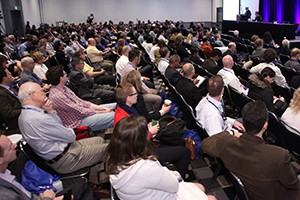
The ATS Keynote Series brings eight state-of-the-art lectures to conference attendees.
The ATS 2016 International Conference provides an exciting venue for scientific exchange. The ATS Keynote Series will showcase major discoveries in pulmonary, critical care, and sleep medicine through eight state-of-the-art lectures on selected topics—two offered each day—when no other programming is offered. In selecting speakers, ATS 2016 planners looked for input from members and various committees, with consensus built by the ATS Executive Committee.
Sunday, May 15
- Personalized Management of Obstructive Sleep Apnea—John Stradling, MD, MBBS, emeritus professor of respiratory medicine and consultant physician at the Nuffield Department of Medicine at University of Oxford, United Kingdom
- Idiopathic Pulmonary Fibrosis: Past, Present, Future—Talmadge King, MD, dean of the School of Medicine, vice chancellor of medical affairs, and chair of the department of medicine at the University of California San Francisco, San Francisco, California
Idiopathic Pulmonary Fibrosis: Past, Present, Future (K2) is supported by educational grants from Boehringer Ingelheim Pharmaceuticals, Inc., and Genentech.
Monday, May 16
- Lung Cancer Detection and Prevention in the Precision Medicine Era— Avrum Spira, MD, MSc, chief of the Division of Computational Biomedicineprofessor of medicine, pathology and laboratory medicine, and bioinformatics at Boston University School of Medicine, and director of Translational Bioinformatics Program, Clinical and Translational Science Institute, Boston, Massachusetts
- Pulmonary Hypertension: Evolution of PAH and CTEPH—Nick H. Kim, MD, clinical professor of medicine, director of pulmonary vascular medicine, and director of the pulmonary and critical care medicine fellowship at the University of California, San Diego School of Medicine, and clinical service chief of Thornton PCCM, La Jolla, California
Lung Cancer Detection and Prevention in the Precision Medicine Era (K3) is supported by an educational grant from AstraZeneca LP.
Pulmonary Hypertension: Evolution of PAH and CTEPH (K4) is supported by educational grants from Actelion Pharmaceuticals US, Inc., Gilead Sciences, Inc., and United Therapeutics Corporation.
Tuesday, May 17
- The Changing Natural Course of COPD—Bartolome R. Celli, MD, physician at Brigham and Women’s Hospital and professor at Harvard Medical School, Boston, Massachusetts
- Structural Insights Into GPCR Signaling: Implications for Drug Discovery—Brian K. Kobilka, MD, a Nobel Laureate, and Helene Irwin Fagan Chair in Cardiology and professor of chemical and systems biology at the Stanford School of Medicine, Stanford, California
The Changing Natural Course of COPD (K5) is supported by educational grants from AstraZeneca LP and GlaxoSmithKline.
Structural Insights Into GPCR Signaling: Implications for Drug Discovery (K6) is supported by educational grants from AstraZeneca LP, Genentech, GlaxoSmithKline, Meda Pharmaceuticals, Inc., and Teva Pharmaceuticals.
Wednesday, May 18
- Biomarkers for Precision Medicine in Asthma—Serpil C. Erzurum, MD, chair of the department of pathobiology, joint staff with Respiratory Institute, and the Alfred Lerner Memorial Chair in Innovative Biomedical Research at the Cleveland Clinic, Cleveland, Ohio
- ARDS: Mechanisms and Professional Societies—Brian Kavanagh, MD, chair of the department of anesthesia at the University of Toronto, the Dr. Geoffrey Barker Chair in Critical Care Medicine at the Hospital for Sick Children and the University of Toronto, and research director of the department of critical care medicine at the Hospital for Sick Children, Toronto, Ontario, Canada
Biomarkers for Precision Medicine in Asthma (K7) is supported by educational grants from AstraZeneca LP, Genentech, GlaxoSmithKline, Meda Pharmaceuticals, Inc., Sanofi US and Regeneron Pharmaceuticals, and Teva Pharmaceuticals.
